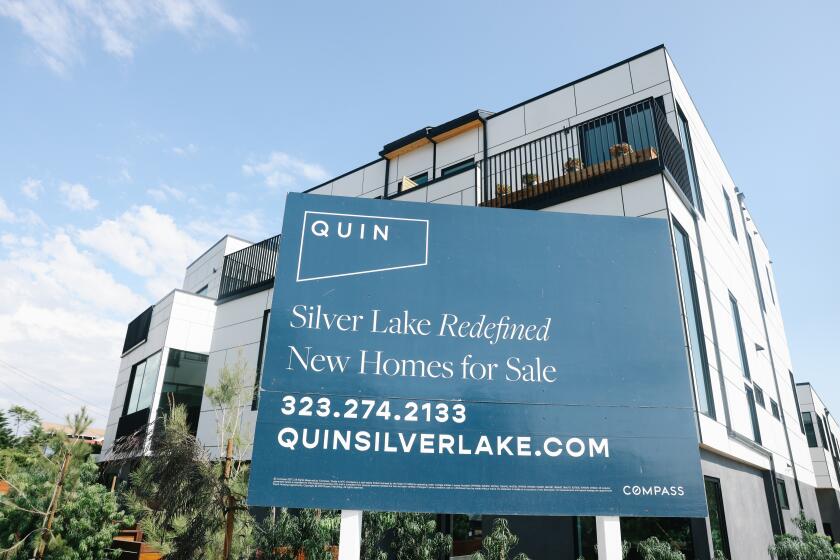Can association board ban condo ‘for sale’ signs?
Question: We live in a gated community with approximately 150 joined single-story condos. We want to sell but have been told by a board director that real estate “for sale” signs are not allowed per our covenants, conditions and restrictions.
He cites the CC&Rs: “No owner, tenant or other occupant of the covered property shall post any advertisement, signs, flags, banners or poster of any kind for public display, provided that with the prior written approval of the board as to size, type, color, style and location, a sign of customary and reasonable dimension may be posted to advertise a lot for sale or lease. The board shall have the right to remove an item displayed in violation of this subparagraph.”
Aren’t owners entitled to free speech? Because our community is gated, how can we properly market our home if no real estate sale or lease signs are allowed anywhere?
Answer: Under Civil Code section 1353.6(a) governing documents, including operating rules, may not prohibit posting of noncommercial signs, posters, flags, or banners on or in an owner’s separate interest (except as required for the protection of public health or safety or if the posting or display would violate a local, state or federal law). However, under section 1353.6(c) an association may prohibit noncommercial signs and posters that are more than 9 square feet in size and noncommercial flags or banners that are more than 15 square feet in size.
In the case Fourth La Costa Condominium Owners Assn. vs. Seith, the court interpreted Civil Code section 1353.6 as pertaining only to noncommercial speech and held that signs advertising property for sale or for lease constitute “commercial speech” as the advertiser’s interest is purely economic. Commercial speech is that which proposes a commercial transaction.
Your covenants, conditions and restrictions give owners rights to place “for sale” signs on their properties and in common areas with board consent. Although your CC&Rs may allow the board to prescribe the “format” for your individual sign, arbitrarily or unreasonably prohibiting signs altogether will be construed as a void, or voidable, policy.
Address your written request to the board to post a “for sale” sign. Your writing requires the board to consider the request and make a reasonable and timely decision. The request should include your proposed design, sign dimensions, sign location and expected duration of posting.
Pursuant to Civil Code section 1368.1(a), any association rule or regulation that arbitrarily or unreasonably restricts an owner’s ability to market his or her interest in a common interest development is void. An absolute prohibition on advertising a deed-restricted property for sale would violate this statute, which explains why your CC&Rs allow for signs to be posted with board approval.
Civil Code section 713 grants owners the right to reasonably display a sign advertising property for sale that includes: that the property is for sale by the owner or its agent; directions to the property; the owner or agent’s name; and the owner or agent’s address and telephone number. Civil Code section 712 renders void any restriction on placing such a sign that is also of “reasonable dimensions and design” that does “not adversely affect public safety, including traffic safety.” Rights under these sections do not necessarily extend to the common areas of the development.
Under Fourth La Costa Condominium Owners Assn., a “sign” may include directions to the property and the owner’s or the agent’s name, address and telephone number. It is deemed to be of reasonable dimension and design if it complies with a local sign ordinance and applies to the placement of signs on an owner’s real property. In a condominium project, however, unit owners ordinarily have no separate interest in the real property.
The Fourth La Costa Condominium Owners Assn. court held that under certain circumstances, a board may promote the development’s “aesthetics,” ban signs on lawns but allow outward-facing signs in homeowner windows, or impose any variety of aesthetic-related restrictions on placement of signs.
Although most associations understand they cannot prohibit all such signs, courts have upheld unusual restrictions so long as they were not blanket prohibitions. Many associations have a common area dedicated to the placing of “for sale” signs. At some point the board needs to realize that “for sale” signs are a part of life and therefore it is reasonable to have a visible place for them.
Zachary Levine, partner at Wolk & Levine, a business and intellectual property law firm, co-wrote this column. Vanitzian is an arbitrator and mediator. Send questions to P.O. Box 10490, Marina del Rey, CA 90295 or noexit@mindspring.com.






